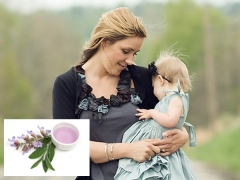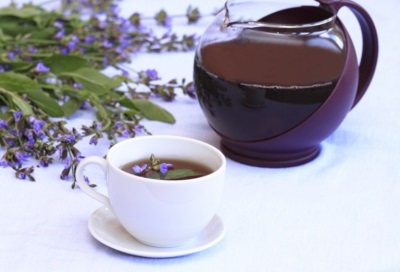Sage to stop lactation
Wanting to complete breast-feeding, women often have to use aids. And the safest of them include sage. How does this medicinal plant affect lactation and what are the peculiarities of its use in order to finish breastfeeding?
pros
- The plant positively affects the body of a woman due to the content of phytoestrogens, improving its hormonal background.
- Compresses with sage oil very quickly reduce lactation, so they can be used as a quick help to stop the formation of milk.
- Sage-based decoctions and infusions act gently and are recommended as a means of reducing milk production gradually. They can be consumed and simultaneously breastfed, while the amount of milk will decrease and after a few days it will no longer be in the breast.
- Sage is used for a long time, therefore its action has been tested by many generations.
Minuses
If a woman has no contraindications and dosages of sage-based products are not exceeded, there will be no minuses for this plant, as well as negative effects on the body of the nursing mother. Moreover, the plant also does not harm the baby, so it allows you to continue to feed the baby and gradually reduce the number of feedings.
Contraindications
Such a folk remedy to eliminate lactation, like sage, can not be taken when:
- Pregnancy;
- Epilepsy;
- Acute inflammatory diseases of the kidneys;
- Severe coughing;
- Individual intolerance.
Sage action
The plant contains vegetable estrogens, increasing their level in the female body. This simultaneously lowers the lactation level of the hormone prolactin. Such sage as medicinal, Spanish and nutmeg have a curative effect.
In addition to reducing the function of the breast, this plant has the following effects:
- Disinfectant;
- Expectorant;
- Anti-inflammatory;
- Inhibition of the function of sweat glands;
- Painkiller;
- Diuretic;
- Carminative;
- Astringent;
- Improves the work of the digestive system.
Application Methods
Sage can be purchased at the pharmacy in a just crushed state, and in bags for brewing.
To stop lactation, the plant can be prepared:
- Infusion. To prepare it, put a teaspoon of crushed sage leaves in a glass of boiling water and leave it for at least an hour. After filtering the infusion, it is taken in a quarter cup before a meal (twenty minutes) four to six times a day.
- Decoction. To prepare it, pour 200 ml of water into the container and, when it boils, add 1 tsp. crushed sage leaves. The plant should be boiled for about ten minutes on a small fire, close and insist for another twenty to thirty minutes. Strained decoction taken four times a day, one tablespoon.
- Tea. One bag of sage poured a glass of boiling water. Cooked tea is divided into two or three servings and drink during the day. To improve the taste in the drink, you can add honey. The next day, you need to brew fresh tea.
- Butter. Applying it externally, you can reduce the inflammatory processes in the mammary glands and eliminate seals.Taking the base oil in the amount of 25 ml, add a few drops of sage oil. Prepare the oil mixture moistened slightly damp gauze and applied to the chest for half an hour. Such compresses do several times a day.
If you are not already breastfeeding, you can use alcohol tincture. It is taken 3-6 times a day, 30-60 drops, dissolving them in water.
Tips
- Exceeding the dosage of sage is not recommended. Also, products based on this plant are not consumed for more than three months.
- If you need to roll lactation gently and you have enough time for this, then use sage in the form of decoctions and infusions. If the termination of breastfeeding occurred abruptly, use alcohol tincture, extract, as well as oil.













